高一定语从句 语法归纳及练习
高一定语从句分析高级运用练习50题含答案解析
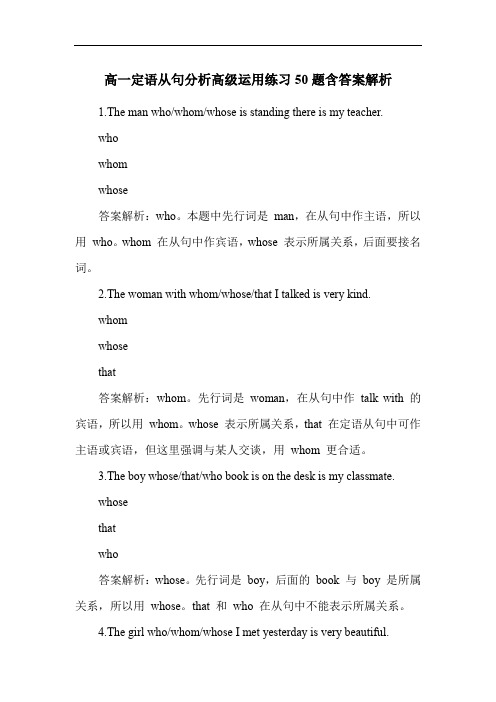
高一定语从句分析高级运用练习50题含答案解析1.The man who/whom/whose is standing there is my teacher.whowhomwhose答案解析:who。
本题中先行词是man,在从句中作主语,所以用who。
whom 在从句中作宾语,whose 表示所属关系,后面要接名词。
2.The woman with whom/whose/that I talked is very kind.whomwhosethat答案解析:whom。
先行词是woman,在从句中作talk with 的宾语,所以用whom。
whose 表示所属关系,that 在定语从句中可作主语或宾语,但这里强调与某人交谈,用whom 更合适。
3.The boy whose/that/who book is on the desk is my classmate.whosethatwho答案解析:whose。
先行词是boy,后面的book 与boy 是所属关系,所以用whose。
that 和who 在从句中不能表示所属关系。
4.The girl who/whom/whose I met yesterday is very beautiful.whomwhose答案解析:who。
先行词是girl,在从句中作met 的宾语,但是在口语和非正式文体中,who 也可以代替whom 作宾语。
whose 表示所属关系,不符合题意。
5.The teacher whose/that/who class is very interesting is popular among students.whosethatwho答案解析:whose。
先行词是teacher,后面的class 与teacher 是所属关系,所以用whose。
that 和who 在从句中不能表示所属关系。
6.The man who/whom/whose car is red is a doctor.whowhomwhose答案解析:whose。
高一定语从句练习50题(答案解析)
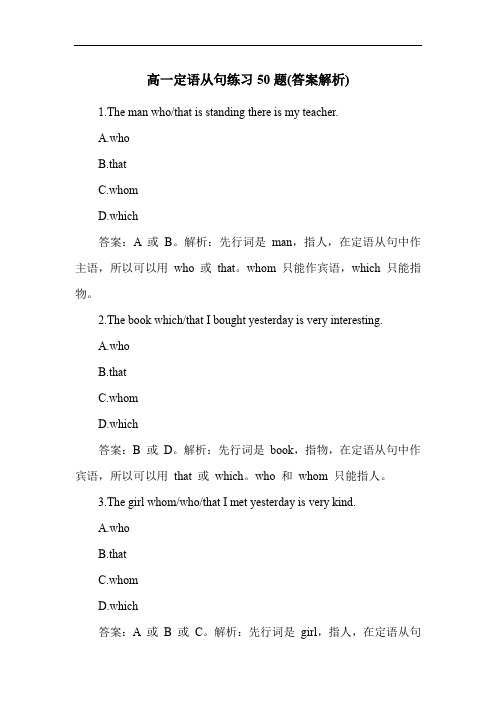
高一定语从句练习50题(答案解析)1.The man who/that is standing there is my teacher.A.whoB.thatC.whomD.which答案:A 或B。
解析:先行词是man,指人,在定语从句中作主语,所以可以用who 或that。
whom 只能作宾语,which 只能指物。
2.The book which/that I bought yesterday is very interesting.A.whoB.thatC.whomD.which答案:B 或D。
解析:先行词是book,指物,在定语从句中作宾语,所以可以用that 或which。
who 和whom 只能指人。
3.The girl whom/who/that I met yesterday is very kind.A.whoB.thatC.whomD.which答案:A 或B 或C。
解析:先行词是girl,指人,在定语从句中作宾语,所以可以用whom、who 或that。
which 只能指物。
4.The house which/that is near the park is very beautiful.A.whoB.thatC.whomD.which答案:B 或D。
解析:先行词是house,指物,在定语从句中作主语,所以可以用that 或which。
who 和whom 只能指人。
5.The boy who/that likes playing basketball is very tall.A.whoB.thatC.whomD.which答案:A 或B。
解析:先行词是boy,指人,在定语从句中作主语,所以可以用who 或that。
whom 只能作宾语,which 只能指物。
6.The woman whom/who/that I talked to is very friendly.A.whoB.thatC.whomD.which答案:A 或B 或C。
高中定语从句讲解与练习(附答案)

高中定语从句讲解与练习(附答案)定语从句专项讲解与练习1、定语从句在句中修饰某个名词或代词,被定语从句修饰的词叫先行词。
定语从句需用下列关联词:关系代词和关系副词。
它们起连词作用,本身做从句的主语、宾语、表语或定语,本身在从句中作时间、地点或原因状语。
主要有who, whom, that, whose, which, as, when, where, why。
PS:what不能引导定语从句. 指人的关系代词有who、whose、whom、that. 指物的关系代词有which、whose(=of which)、that.The old man who/whom /that we visited yesterday is a famous artist.Miss Wang is taking care of the child whose parents have gone to Beijing .The man with whom my father shook hands just now is our headmaster. (=The man who/whom/ that my father shook hands with just now is our headmaster.)I like the books which / that were written by Lu Xun.The desks (which/that) we made last year were very good.This is the house in which we lived last year. (= This is the house which /that we lived in last year.)I live in the room whose windows face south. (= I live in the room ,the windows of which face south.)2、掌握以上关系代词、关系副词的含义及使用时,要特别注意以下几点:1)指人时宜用who 的情况:a. 当先行词是one, ones, anyone 或those , these 时,关系代词用who。
(word完整版)高中英语语法定语从句讲解及练习
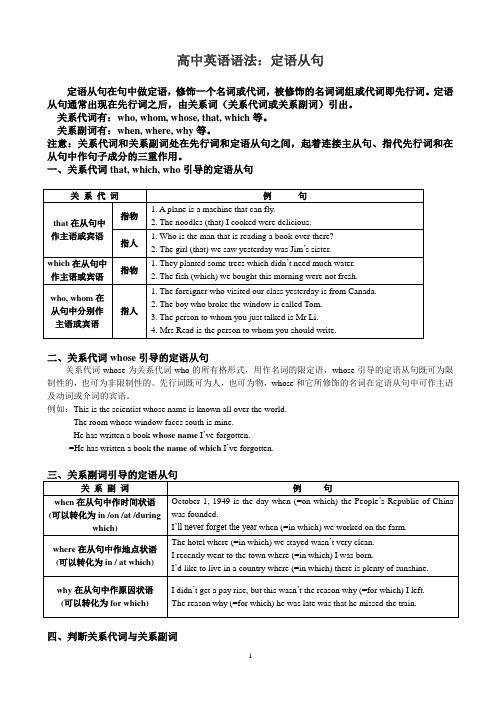
高中英语语法:定语从句定语从句在句中做定语,修饰一个名词或代词,被修饰的名词词组或代词即先行词。
定语从句通常出现在先行词之后,由关系词(关系代词或关系副词)引出。
关系代词有:who, whom, whose, that, which等。
关系副词有:when, where, why等。
注意:关系代词和关系副词处在先行词和定语从句之间,起着连接主从句、指代先行词和在从句中作句子成分的三重作用。
一、关系代词that, which, who引导的定语从句二、关系代词whose引导的定语从句关系代词whose为关系代词who的所有格形式,用作名词的限定语,whose引导的定语从句既可为限制性的,也可为非限制性的。
先行词既可为人,也可为物,whose和它所修饰的名词在定语从句中可作主语及动词或介词的宾语。
例如:This is the scientist whose name is known all over the world.The room whose window faces south is mine.He has written a book whose name I’ve forgotten.=He has written a book the name of which I’ve forgotten.四、判断关系代词与关系副词先把主句和定语从句分开,再找出定语从句所修饰的名词/代词(即先行词),然后放入定语从句中,看看这两者的搭配情况。
1)如果定语从句和该先行词可以直接相连,且在从句中充当主语/宾语/表语的话,则用关系代词。
This is the city (which/that) you visited last year.2)如果定语从句和该先行词无法直接相连,必须另外多加上介词,并在定语从句中充当状语时,则使用关系副词。
This is the city where you stayed last year.选择:1. Is this museum ___ you visited a few days age?A. whereB. thatC. on whichD. the one2. Is this the museum ____ the exhibition was held.A. whereB. thatC. on whichD. the one五、限制性和非限制性定语从句1)定语从句有限制性和非限制性两种。
高一定语从句知识点的整理总结、专项训练题目
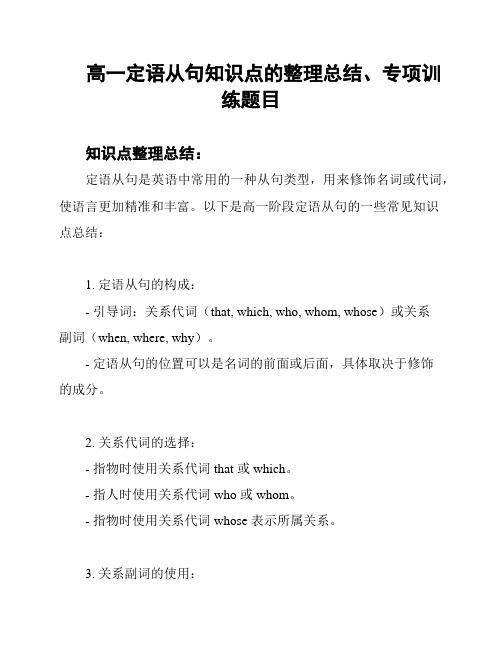
高一定语从句知识点的整理总结、专项训练题目知识点整理总结:定语从句是英语中常用的一种从句类型,用来修饰名词或代词,使语言更加精准和丰富。
以下是高一阶段定语从句的一些常见知识点总结:1. 定语从句的构成:- 引导词:关系代词(that, which, who, whom, whose)或关系副词(when, where, why)。
- 定语从句的位置可以是名词的前面或后面,具体取决于修饰的成分。
2. 关系代词的选择:- 指物时使用关系代词 that 或 which。
- 指人时使用关系代词 who 或 whom。
- 指物时使用关系代词 whose 表示所属关系。
3. 关系副词的使用:- where 表示地点。
- when 表示时间。
- why 表示原因。
4. 定语从句的省略:- 当关系代词在定语从句中作宾语且不作介词宾语时,可以省略。
5. 定语从句的限制性和非限制性:- 限制性定语从句对所修饰的名词起限定作用,不可省略。
- 非限制性定语从句对所修饰的名词作补充说明,用逗号隔开,一般可省略。
专项训练题目:1. 下列句子中有定语从句的是:- A. The book on the table is mine.- B. This is the pen that I lost yesterday.- D. The boy is tall.2. 选择正确的关系代词填空:- The house _______ you bought is very beautiful.- A. where- B. that- C. who3. 选择正确的关系副词填空:- Do you remember the day ______ we went to the beach? - A. when- B. who- C. why4. 下列句子中哪个是限制性定语从句:- A. My brother, who is a doctor, lives in Paris.- B. The dog that I adopted is very friendly.- C. The house, where we spent our vacation, is now on sale.5. 填入合适的关系代词或关系副词:- This is the bus _______ I often take to work.- A. who- B. when- C. that作答:1. B2. B3. A4. B5. C以上是高一定语从句知识点的整理总结和专项训练题目。
高中英语高一定语从句讲解及提升练习(有答案)
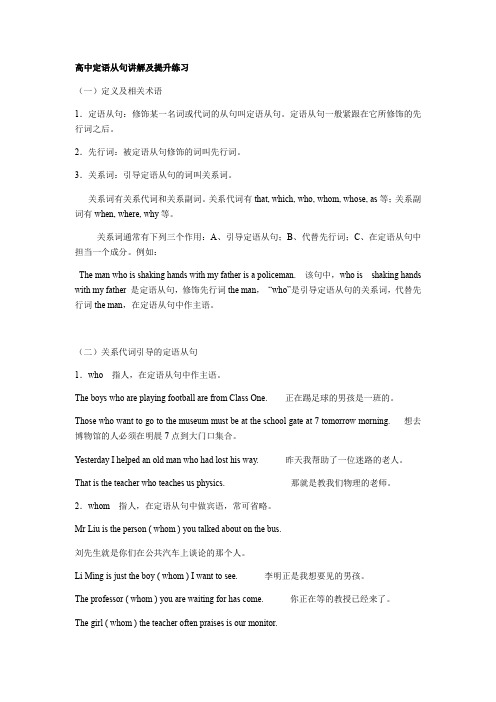
高中定语从句讲解及提升练习(一)定义及相关术语1.定语从句:修饰某一名词或代词的从句叫定语从句。
定语从句一般紧跟在它所修饰的先行词之后。
2.先行词:被定语从句修饰的词叫先行词。
3.关系词:引导定语从句的词叫关系词。
关系词有关系代词和关系副词。
关系代词有that, which, who, whom, whose, as等;关系副词有when, where, why等。
关系词通常有下列三个作用:A、引导定语从句;B、代替先行词;C、在定语从句中担当一个成分。
例如:The man who is shaking hands with my father is a policeman. 该句中,who is shaking hands with my father 是定语从句,修饰先行词the man,“who”是引导定语从句的关系词,代替先行词the man,在定语从句中作主语。
(二)关系代词引导的定语从句1.who 指人,在定语从句中作主语。
The boys who are playing football are from Class One. 正在踢足球的男孩是一班的。
Those who want to go to the museum must be at the school gate at 7 tomorrow morning. 想去博物馆的人必须在明晨7点到大门口集合。
Yesterday I helped an old man who had lost his way. 昨天我帮助了一位迷路的老人。
That is the teacher who teaches us physics. 那就是教我们物理的老师。
2.whom 指人,在定语从句中做宾语,常可省略。
Mr Liu is the person ( whom ) you talked about on the bus.刘先生就是你们在公共汽车上谈论的那个人。
高中英语语法基础 ——定语从句知识点总结归纳讲解(附同步练习)(有答案)
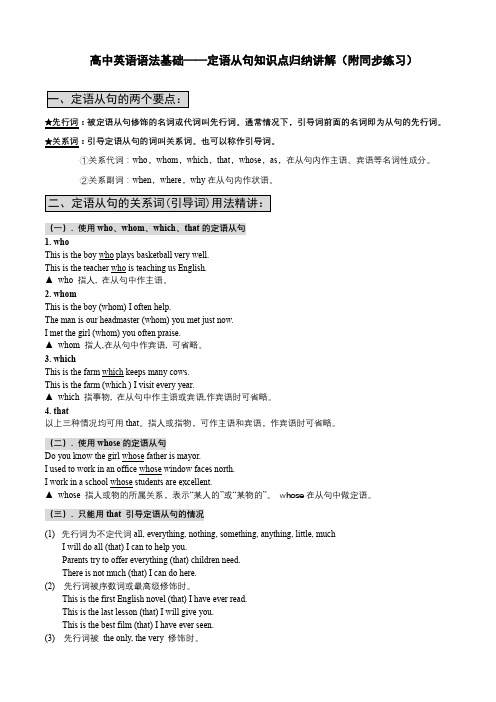
高中英语语法基础——定语从句知识点归纳讲解(附同步练习)★先行词:被定语从句修饰的名词或代词叫先行词。
通常情况下,引导词前面的名词即为从句的先行词。
★关系词:引导定语从句的词叫关系词。
也可以称作引导词。
①关系代词:who,whom,which,that,whose,as,在从句内作主语、宾语等名词性成分。
②关系副词:when,where,why在从句内作状语。
(一). 使用who、whom、which、that的定语从句1. whoThis is the boy who plays basketball very well.This is the teacher who is teaching us English.▲who 指人, 在从句中作主语。
2. whomThis is the boy (whom) I often help.The man is our headmaster (whom) you met just now.I met the girl (whom) you often praise.▲whom 指人,在从句中作宾语, 可省略。
3. whichThis is the farm which keeps many cows.This is the farm (which ) I visit every year.▲which 指事物, 在从句中作主语或宾语,作宾语时可省略。
4. that以上三种情况均可用that。
指人或指物,可作主语和宾语,作宾语时可省略。
(二). 使用whose的定语从句Do you know the girl whose father is mayor.I used to work in an office whose window faces north.I work in a school whose students are excellent.▲whose 指人或物的所属关系,表示“某人的”或“某物的”。
高中定语从句语法专题讲解(带练习有答案)
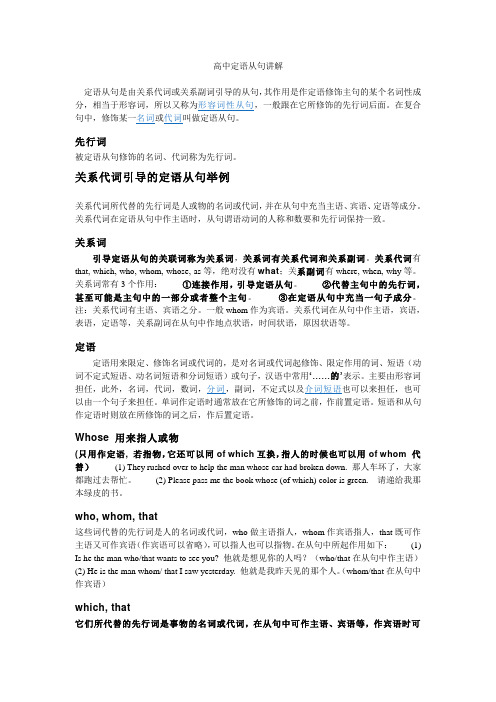
高中定语从句讲解定语从句是由关系代词或关系副词引导的从句,其作用是作定语修饰主句的某个名词性成分,相当于形容词,所以又称为形容词性从句,一般跟在它所修饰的先行词后面。
在复合句中,修饰某一名词或代词叫做定语从句。
先行词被定语从句修饰的名词、代词称为先行词。
关系代词引导的定语从句举例关系代词所代替的先行词是人或物的名词或代词,并在从句中充当主语、宾语、定语等成分。
关系代词在定语从句中作主语时,从句谓语动词的人称和数要和先行词保持一致。
关系词引导定语从句的关联词称为关系词,关系词有关系代词和关系副词。
关系代词有that, which, who, whom, whose, as等,绝对没有what;关系副词有where, when, why等。
关系词常有3个作用:①连接作用,引导定语从句。
②代替主句中的先行词,甚至可能是主句中的一部分或者整个主句。
③在定语从句中充当一句子成分。
注:关系代词有主语、宾语之分。
一般whom作为宾语。
关系代词在从句中作主语,宾语,表语,定语等,关系副词在从句中作地点状语,时间状语,原因状语等。
定语定语用来限定、修饰名词或代词的,是对名词或代词起修饰、限定作用的词、短语(动词不定式短语、动名词短语和分词短语)或句子,汉语中常用‘……的’表示。
主要由形容词担任,此外,名词,代词,数词,分词,副词,不定式以及介词短语也可以来担任,也可以由一个句子来担任。
单词作定语时通常放在它所修饰的词之前,作前置定语。
短语和从句作定语时则放在所修饰的词之后,作后置定语。
Whose 用来指人或物(只用作定语, 若指物,它还可以同of which互换,指人的时候也可以用of whom 代替)(1) They rushed over to help the man whose car had broken down. 那人车坏了,大家都跑过去帮忙。
(2) Please pass me the book whose (of which) color is green.请递给我那本绿皮的书。
- 1、下载文档前请自行甄别文档内容的完整性,平台不提供额外的编辑、内容补充、找答案等附加服务。
- 2、"仅部分预览"的文档,不可在线预览部分如存在完整性等问题,可反馈申请退款(可完整预览的文档不适用该条件!)。
- 3、如文档侵犯您的权益,请联系客服反馈,我们会尽快为您处理(人工客服工作时间:9:00-18:30)。
高一定语从句语法归纳及练习一、语法知识归纳一、基本概念(一)定语从句在复合句中作定语,修饰名词或代词的从句叫定语从句。
(二)先行词被定语从句所修饰的名词或代词。
一般情况下,定语从句紧跟先行词。
但也有因各种原因定语从句与先行词被分割的现象。
(三)关系代词和关系副词定语从句的引导词。
与先行词关系密切,因此紧跟先行词,并在定语从句中充当一个成分。
关系代词有:who, whom, which, that和whose, 另外,as也可充当关系代词。
关系代词在定语从句中充当主语、宾语、表语和定语。
关系副词有:when, where和why。
在定语从句中充当状语。
二、关系代词的用法(一)基本用法根据先行词的不同,和在从句中所充当的成分不同,选用不同的关系代词。
① Do you know the professor who/that will give us a speech next week? (作主语)② I read a report about his new novel that/ which will soon be published. (作主语)③ The plan that/which they argued about was settled at last. (作宾语)④ This is the new secretary (who/whom/that) I would like to introduceto you. (作宾语)⑤ The soldier whose legs were badly wounded was operated onwithout delay. (作定语)注意:关系代词在定语从句中充当宾语时可以省略,充当主语时则不能。
(见上例③④)(二)关系代词that代替which的一些情况which, that 在代替物时,一般可以通用。
但在有些情况下,只用 that。
⑴先行词是最高级形容词或它的前面有最高级形容词修饰时。
例如:① This is the best that has been used against pollution.② English is the most difficult subject that you will learn during these years.⑵先行词是序数词,或它前面有一个序数词时。
例如:① This is the last place (that) I want to visit.② It is the first American movie of this kind that I’ve ever seen.⑶先行词是 all, much, little, something, everything, anything, nothing, none等代词时。
例如:① You should hand in all that you have.②We haven’t got much that we can offer you.⑷先行词前面有the only, the very, any, few, little, no, all, much, every等修饰时。
例如:① The only thing that we can do is to give you some money.② The little money (that) he had was stolen.(三)宜用who, 而不用that的一些情况⑴先行词是one, ones, anyone时。
例如:① One who has nothing to fear for oneself dares to tell the truth.②Don’t tell anyone about the news who oughtn’t to know it.⑵先行词是those时。
例如:① Those who were not fit for their work could not see the beautiful clothes made of the magic cloth.(四)其它情况⑴先行词既有人又有物时。
例如:① Do you know the things and persons that they are talking about?② The bike and its rider that had run over an old man were taken to the police station.⑵主句已有疑问词who 或which时。
例如:① Which is the bike that you lost?② Who is the woman that was praised at the meeting?(五)与whose有关的问题⑴ whose是代词的所有格,它既可以代人也可以代物。
例如:① I saw a woman whose bag was stolen.② Please show me the book whose cover is red.⑵当whose表示物与物的所有格关系时,亦可用of which的形式。
例如:① The building whose roof you can see from here is a new restaurant.→ The building, the roof of which you can see from here, is a new restaurant.或→ The building, of which the roof you can see from here is a new restaurant.三、介词前提的问题关系代词在定语从句中充当介词宾语时,介词可以前提至关系代词前。
例如:Have you seen the pen?(which作介词with的宾语)→Have you seen th e pen with which I wrote the note just now?但是,要注意的是:⑴介词前提后,先行词是人或物,关系代词分别只能用whom和which,而不再用that或who。
⑵介词前提后,关系代词不再能省略。
⑶有些含有介词的短语动词中的介词不能前提,如:look for, look after, take care of等。
例如:①错误:Who is the old man to that you were talking to?正确:Who is the old man to whom you were talking ? 或 Who is the old man (that/ whom) you were talking to?②错误:These are the sheep of which the boy took care.正确:These are the sheep (which/that) the boy took care of.四、关系代词在从句中作主语时,从句中的主谓一致关系代词在定语从句中作主语时,从句的谓语动词在人称和数上应与先行词一致。
例如:① Who is the guy that is reading over there?② The number of people that are going to the exhibition is expected to be over 25,000.③ All that needs to be done has been done.④ He is one of the students who use computer a lot for study.⑤ Timmy is the only one of the pupils that has failed the exam.例③中的all意为“一切”,作单数。
例⑤中没通过考试的学生事实上只有一人,因此谓语动词也用单数。
高一定语从句专项练习(1)1. The place _______interested me most was the Children's Palace.A. WhichB. whereC. whatD. in which2. Do you know the man _______?A. whom I spokeB. to who spokeC. I spoke toD. that I spoke3. This is the hotel _______last month.A. which they stayedB. at that they stayedC. where they stayed atD. where they stayed4. Do you know the year ______the Chinese Communist Party was founded?A. whichB. thatC. whenD. on which5. That is the day ______I'll never forget.A. whichB. on whichC. in whichD. when6. The factory ______we'll visit next week is not far from here.A. whereB. to whichC. whichD. in which7. Great changes have taken place in the factory ____we are working since then.A. whereB. thatC. whichD. there8. This is one of the best films _______.A. that have been shown this yearB. that have shownC. that has been shown this yearD. that you talked9. Can you lend me the book ______the other day?A. about which you talkedB. which you talkedC. about that you talkedD. that you talked10. The pen ______he is writing is mine.A. with whichB. in whichC. on whichD. by which11. They arrived at a farmhouse, in front of ______sat a small boy.A. whomB. whoC. whichD. that12. The engineer ______my father works is about 50 years old.A. to whomB. on whomC. with whichD. with whom13. Is there anyone in your class ______family is in the country?A. whoB. who'sC. whichD. whose14. I'm interested in ______you have said.A. all thatB.all whatC. thatD. which15. I want to use the same dictionary ______was used yesterday.A. whichB. whoC. whatD. as16. He isn't such a man ______he used to be.A. whoB. whomC. thatD. as17. He is good at English, ______we all know.A. thatB. asC. whomD. what18. Li Ming, ______to the concert enjoyed it very much.A. I went withB. with whom I wentC. with who I wentD.I went with him19. I don't like ______ as you read.A. the novelsB. the such novelsC. such novelsD. same novels20. He talked a lot about things and persons _______they remembered in the school.A. whichB. thatC. whomD. what21. The letter is from my sister, ______is working in Beijing.A. whichB. thatC. whomD. who22. In our factory there are 2,000 workers, two thirds of ____are women.A. themB. whichC. whomD. who23. You're the only person ______I've ever met ______could do it.A. who;/B./; whomC. whom;/D./; who24. I lost a book, ______I can't remember now.A. whose titleB. its titleC. the title of itD. the title of that25. Last summer we visited the West Lake, ______Hangzhou is famous in the world.A.for whichB.for thatC.in which D what26. I have bought such a watch _______ was advertised on TV.A. thatB. whichC. asD. it27. I can never forget the day _______ we worked together and the day______ we spent together.A.when; whichB.which; whenC.what; thatD.on which; when28. The way ______he looks at problems is wrong.A. whichB. whoseC. whatD./29. This is the reason ______he didn't come to the meeting.A. in whichB. with whichC. thatD. for which30. This machine, ______for many years, is still working perfectly.A.after which I have lookedB. which I have looked afterC. that I have looked afterD. I have looked after31. The reason ______he didn't come was ______he was ill.A. why; thatB. that; whyC. for that; hatD. for which; what32. He is working hard, ______will make him pass the final exam.A.thatB.whichC.for whichD.who33. That is not the way ______I do it.A./B.whichC.for whichD.with which34. I have two grammars, ______are of great use.A. all of whichB. either of whichC. both of thatD. both of which35. I want to use the same tools _______used in your factory a fewA.as wasB. which wasC.as wereD. which36. My neighbors used to give me a hand in time of trouble, _______ was very kind of them.A. whoB. whichC. thatD. it37. This is the magazine _______ I copied the paragraph.A. thatB. whichC. from thatD. from which38. He is not such a man _______ would leave his work half done.A. thatB. whichC. whoD. as39. You can depend on whatever promise _______ he makes.A. /B. whyC. whenD. whose40. Smoking, _______ is a bad habit, is, however, popular.A. thatB. whichC. itD. though41. --- Did you ask the guard _______ happened?--- Yes, he told me all _______ he knew.A.what; thatB. what; whatC. which; whichD. that; that42. I shall never forget those years _______ I lived on the farm with the farmers, _______ has a great effect on my life.A.when; whoB.that; whichC. which; thatD. when; which43. The number of the people who _______ cars _______increasing.A.owns; areB. owns; isC. own; isD. own; are44. During the days ________, he worked as a servant at the Browns.A.followedB.followingC.to followD.that followed45. Is oxygen the only gas _______ helps fire burn?A. thatB. /C. whichD. it。
